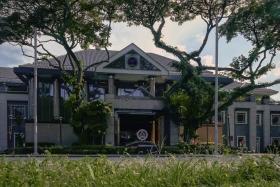More Singaporeans accepting of gay rights, pre-marital sex: Survey
Institute of Policy Studies survey shows Singapore society still conservative but young people are more liberal towards issues such as gay rights
People in Singapore are now more liberal in their views on gay rights, even as society remains largely conservative.
A survey by the Institute of Policy Studies (IPS) on perceptions and attitudes towards social and moral issues found that there is greater acceptance of gay sex, gay marriage and adoption by gay couples than five years ago when the same survey was done.
Overall, slightly more than 20 per cent of people polled between August 2018 and January 2019 said sexual relations between adults of the same sex are not wrong at all or not wrong most of the time, a rise from about 10 per cent in 2013.
Around 27 per cent felt the same way about gay marriage (15 per cent in 2013) and 30 per cent did so about gay couples adopting a child (24 per cent previously).
The findings, released by IPS yesterday, are part of a wider survey on race, language and religion, and come at a time of greater scrutiny of the conservative-liberal divide on moral, social and political issues.
More than 4,000 Singapore residents were asked to indicate how they feel on a range of issues, by choosing whether it is "not wrong at all", "not wrong most of the time", "only wrong sometimes", "almost always wrong" or "always wrong".
A similar number of people were polled in 2013.
The large-scale, nationally representative survey was weighted by race and age according to the proportions in Singapore's population.
In general, people have become less conservative on moral issues, with fewer opposing not just gay rights, but also pre-marital sex and cohabitation, said IPS senior research fellow Mathew Mathews, research associate Leonard Lim, and research assistant Shanthini Selvarajan, the authors of the paper on the survey.
The changes are most stark on homosexual rights, mirroring international trends in countries such as the US where there is less resistance in this area amid greater advocacy by lesbian, gay, bisexual, transgender and queer (LGBTQ) groups.
DIVIDED
The survey found that age is a factor in the liberal-conservative divide here, with the young more liberal than the old.
For instance, among those aged 18 to 25, about 47 per cent indicated they are not opposed to pre-marital sex.
Among those older than 65, only 16 per cent felt the same way.
On homosexual sex, about 49 per cent of the younger age group thought it is not wrong compared to only 10 per cent in the older age group.
In fact, it is in the area of gay rights that the divergence is the most stark.
In 2013, about 18 per cent who were aged 20 to 24 felt that gay sex was not wrong. Five years on, more than 40 per cent of the cohort, now aged 25 to 28, feel the same way.
This shift to a more liberal attitude in a cohort is much less pronounced among older respondents, a sign that they are slower in accepting gay rights issues.
For instance, in 2013, 11 per cent of those aged 55 to 59 said gay marriage was not wrong. In 2018, about 15 per cent of the cohort, now aged 60 to 64, said the same thing.
The authors said if the trends continued, there could be greater acceptance of gay rights in Singapore in future.
Asked about the implications this will have on section 377A of the Penal Code, which criminalises sex between men, Mr Lim said: "The Government has maintained that any changes to the law must take into account where the majority of public opinion stands on the issue.
"Our results, while they point to a growing acceptance of gay sex as well as other matters surrounding gay rights, still show that most Singaporeans remain opposed to these issues.
"We cannot say for certain when the scales will be tipped in favour of gay rights but if present trends continue, it may not be very long before that takes place."
Get The New Paper on your phone with the free TNP app. Download from the Apple App Store or Google Play Store now



